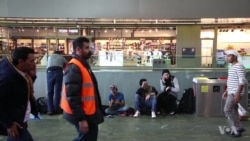Train stations flooded with thousands fleeing war and poverty in Asia and the Middle East have characterized Europe's refugee crisis.
At the Austrian capital's main train station, an initially small volunteer effort to provide humanitarian aid has grown with the numbers of arrivals and turned the station into a refugee hub.
Volunteers started out with just a couple of tables of snacks but now serve up to 3,000 people three meals a day.
“We never know how many they let in and how many will come direct to Vienna or how many will be sent somewhere else directly,” said Manjit Aulakh of the Vienna Sikh Temple. “We have to take care of them, of course. And there are always new people coming in.”
Aulakh was one of two Sikh men, wearing traditional turbans and sporting long beards, in a line of jolly volunteers who ladled out scoops of curry from huge pots on a table.
Several women, some in headscarves and one with long, tangled dreadlocks, cut vegetables on a table behind them.
Trucks of rice, lentils
British donors brought four trucks of food, mainly rice and lentils for only vegetarian meals.
“We can serve any religion as they are,” Aulakh said. “Everybody eats rice.”
There was also a table giving out free SIM cards for mobile phones and another with what looked like an endless supply of tea and coffee.
An Italian volunteer insisted that a reporter take a large box of chocolate cookies and a liter of orange juice. “We have plenty,” he said.
Some refugees sorted through tables of donated clothes under a nearby tent. A mass of young men sat, stood and stared at their phones tethered to a charging station.
Handwritten signs in English and Arabic offered “information” or legal advice. Others appealed help in finding those “missing” in the wave of refugees and other migrants flooding into Europe.
Children bounced balls, played badminton and scooted around the train station floor on plastic carts.
Organizers estimated that they had helped about 40,000 refugees and other migrants.
The effort “grew a lot,” said Ashley Winkler, an organizer with Train of Hope, an aid group formed since the migrant crisis exploded in early September. “We started with 20 to 30 people. We now have 3,000 people in our list of volunteers.”
Medical assistance
Inside a room marked “First Aid,” medics examined a man's chest. Doctors and nurses were among an army of volunteers speaking eight different languages.
Mohammad Abbas Alaoni fled Syria for Austria five months ago to escape the Islamic State terrorist group. He said he wanted to learn German so he could study at a university.
But since September, he has been helping new arrivals in Vienna. “I came to help people because I know it is hard and tiring,” he said. “I would like to help because I know what it is like, and I would like everyone to be better off.”
Mohammad and an Iraqi volunteer, also a refugee, directed two newly arrived migrants — like most, young and male — to the train ticket office. Most who arrived were keen to continue their journey to other parts of Austria or further to Germany.
Local authorities have given their full support, and volunteers like Mohammad said they would remain as long as needed.





